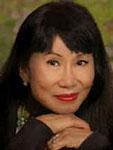 繁体
繁体

谭恩美(Amy Tan),美籍华裔作家,1952年出生于美国加州奥克兰,曾就读医学院,后来放弃学医,在圣荷西州立大学学习英语和语言学,分别于1973年和1974年获得学士学位和硕士学位。1975年,谭恩美获得了加州大学柏克莱分校攻读博士学位的全额奖学金,她在博士课程学习的第二年放弃了学业。
谭恩美的全部作品集
At the beginning of Amy Tan's fourth novel, two packets of papers written in Chinese calligraphy fall into the hands of Ruth Young. One bundle is titled Things I Know Are True and the other, Things I Must Not Forget. The author? That would be the protagonist's mother, LuLing, who has been diagnosed with Alzheimer's disease. In these documents the elderly matriarch, born in China in 1916, has set down a record of her birth and family history, determined to keep the facts from vanishing as her mind deteriorates.A San Francisco career woman who makes her living by ghostwriting self-help books, Ruth has little idea of her mother's past or true identity. What's more, their relationship has tended to be an angry one. Still, Ruth recognizes the onset of LuLing's decline--along with her own remorse over past rancor--and hires a translator to decipher the packets. She also resolves to ask her mother to tell her about her life. For once, she would ask. She would listen. She would sit down and not be in a hurry or have anything else to do.Framed at either end by Ruth's chapters, the central portion of The Bonesetter's Daughter takes place in China in the remote, mountainous region where anthropologists discovered Peking Man in the 1920s. Here superstition and tradition rule over a succession of tiny villages. And here LuLing grows up under the watchful eye of her hideously scarred nursemaid, Precious Auntie. As she makes clear, it's not an enviable setting:I noticed the ripe stench of a pig pasture, the pockmarked land dug up by dragon-bone dream-seekers, the holes in the walls, the mud by the wells, the dustiness of the unpaved roads. I saw how all the women we passed, young and old, had the same bland face, sleepy eyes that were mirrors of their sleepy minds.Nor is rural isolation the worst of it. LuLing's family, a clan of ink makers, believes itself cursed by its connection to a local doctor, who cooks up his potions and remedies from human bones. And indeed, a great deal of bad luck befalls the narrator and her sister GaoLing before they can finally engineer their escape from China. Along the way, familial squabbles erupt around every corner, particularly among mothers, daughters, and sisters. And as she did in her earlier The Joy Luck Club, Amy Tan uses these conflicts to explore the intricate dynamic that exists between first-generation Americans and their immigrant elders. --Victoria Jenkins
《喜福会》是美国著名华裔女作家谭恩美的第一部长篇小说,也是她的成名作,甫一出版即大获成功,当年曾经连续八个月荣登《纽约时报》畅销书排行榜,旋即改编为同名影片,影响深远。小说描写了四位性格、命运各异的中国女性抛却国难家仇,移居美国,以及她们各自在美国出生、成长的女儿的生活经历。作为第一代移民的母亲们虽已身在异国,却仍是彻头彻尾的中国女性,国难家仇可以抛在身后,却无法抛却与祖国的血脉亲情。而在美国出生的女儿们,虽外表看来与母亲非常相像,却是迥异于中华入国的价值观与环境下成长起来的,并不得不亲身承受两种文化与价值观的冲撞。母女之间既有深沉执著的骨肉亲情,又有着无可奈何的隔膜怨恨,既相到关心又相到伤害……不过,超越了一切的仍是共同的中华母亲,是血浓于水的母女深情。谭恩美(Amy Tan),美国华裔作家。1952年出生于美国加州奥克兰,曾就读医学院,后取得语言学硕士学位。她因处女作《喜福会》而一举成名,成为当代美国的畅销作家。著有长篇小说《灶神之妻》、《灵感女孩》和为儿童创作的《月亮夫人》、《中国暹罗猫》等,作品被译成20多种文字在世界上广为流传。如今谭恩美已然成为美国文坛少数民族作家的一位代表人物,而在当今美国社会倡导多元文化的大背景下,她的地位早已渐渐超越了一位少数民族或者流行小说家的身份,而成为整个美国乃至西方最为著名的作家之一。
与母亲的谅解备忘录 、精雕细刻的象牙球美国华裔女作家,自1989年发表成名作《喜福会》以来,早已超越了一位少数民族或者流行小说家的身份,成为美国乃至于西方的最为著名的一流作家之一。美国华裔作家谭恩美自1989年发表成名作《喜福会》以来,早已超越了一位少数民族或者流行小说家的身份,成为整个美国乃至西方最为著名的一流大作家之一。《接骨师之女》是谭恩美的第四部长篇小说,出版于2001年,可以说是她自传性最强、表现华裔移民母女关系最为深入和感人的巨作。母亲茹灵患上了老年痴呆症,为了防止遗忘她将自己的身世和家族秘密记录在案:女儿露丝是位代人捉刀的作家,在与男友同居十年后正陷入感情和事业的低谷。母亲的讲述使我们见证了北京郊区一个制墨世家的兴衰,北京人骨的发掘,一位接骨大夫的女儿,即茹灵生身母亲的惨烈遭遇,以及茹灵姐妹如何于国仇家难之中幸存下来,又如何先后抛下过去的种种伤痛,最终来到美国的坎坷经历。女儿在读了母亲的记录之后,才理解了母亲的过去,得以明白母亲性格中种种的别扭与为难,于是谅解了母亲早年对自己的伤害、反省了自己年少青涩时犯下的种种错误,也因此更加深层地挖掘到自己性格之中的问题,与母亲,与男友的关系也最终教得到和解、为亲人创作,讲述她们的故事。
Four mothers, four daughters, four families whose histories shift with the four winds depending on who's saying the stories. In 1949 four Chinese women, recent immigrants to San Francisco, begin meeting to eat dim sum, play mahjong, and talk. United in shared unspeakable loss and hope, they call themselves the Joy Luck Club. Rather than sink into tragedy, they choose to gather to raise their spirits and money. To despair was to wish back for something already lost. Or to prolong what was already unbearable. Forty years later the stories and history continue.With wit and sensitivity, Amy Tan examines the sometimes painful, often tender, and always deep connection between mothers and daughters. As each woman reveals her secrets, trying to unravel the truth about her life, the strings become more tangled, more entwined. Mothers boast or despair over daughters, and daughters roll their eyes even as they feel the inextricable tightening of their matriarchal ties. Tan is an astute storyteller, enticing readers to immerse themselves into these lives of complexity and mystery.